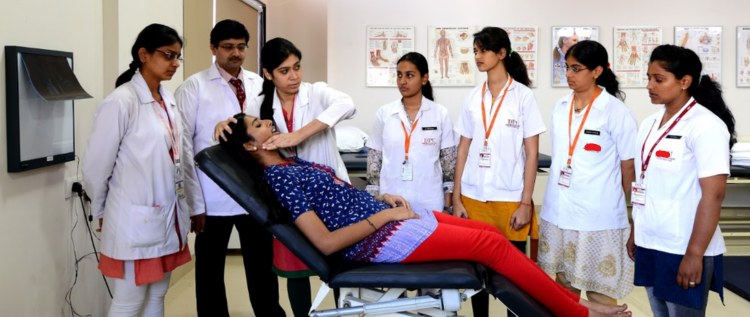Our Courses
All Courses
Bachelor of Physiotherapy

A Bachelor of Physiotherapy program is designed to equip students with the knowledge and skills necessary to become competent physiotherapy professionals. Physiotherapy, often referred to as physical therapy, is a healthcare profession focused on improving a person’s physical function and mobility, alleviating pain, and preventing disability through exercise, manual therapy, education, and advice.
Here’s a breakdown of what a Bachelor of Physiotherapy program typically covers:
Anatomy and Physiology: Students learn about the structure and function of the human body, including bones, muscles, nerves, and organs. Understanding anatomy and physiology is fundamental to assessing and treating various conditions.
Biomechanics and Kinesiology: This area of study explores how the body moves and the mechanics behind movement. Students learn about muscle actions, joint movements, and the principles of biomechanics, which are essential for developing effective treatment plans.
Pathology: Students study various diseases, injuries, and medical conditions that affect the musculoskeletal, neurological, and cardiopulmonary systems. Understanding pathology helps physiotherapists diagnose and treat patients effectively.
Physical Assessment and Diagnosis: Physiotherapists must be proficient in assessing patients’ physical conditions, identifying impairments, and formulating accurate diagnoses. Students learn a variety of assessment techniques, such as range of motion testing, muscle strength evaluation, and special tests for specific conditions.
Therapeutic Modalities: This includes learning about different treatment techniques and modalities used in physiotherapy, such as manual therapy, therapeutic exercises, electrotherapy, heat and cold therapy, and hydrotherapy. Students learn when and how to apply these modalities based on patients’ needs and conditions.
Exercise Prescription and Rehabilitation: Physiotherapists often prescribe specific exercises to help patients improve strength, flexibility, balance, and endurance. Students learn how to design individualized exercise programs and rehabilitation protocols to optimize patients’ recovery and functional outcomes.
Clinical Practice and Professional Skills: Bachelor of Physiotherapy programs typically include clinical placements or internships where students gain hands-on experience working with patients under the supervision of qualified physiotherapists. This allows students to apply theoretical knowledge in real-world settings and develop essential clinical and professional skills, such as communication, teamwork, and ethical practice.
Health Promotion and Education: Physiotherapists play a crucial role in promoting health and preventing injuries and disabilities. Students learn about health promotion strategies, patient education techniques, and community outreach initiatives aimed at improving overall health and well-being.
Upon completion of a Bachelor of Physiotherapy program, graduates are eligible to apply for licensure or registration as physiotherapists in their respective countries or regions. Many graduates choose to further their education through postgraduate studies or specialized certifications to enhance their skills and career opportunities in areas such as sports physiotherapy, pediatric physiotherapy, orthopedic physiotherapy, neurorehabilitation, or cardiopulmonary physiotherapy.
